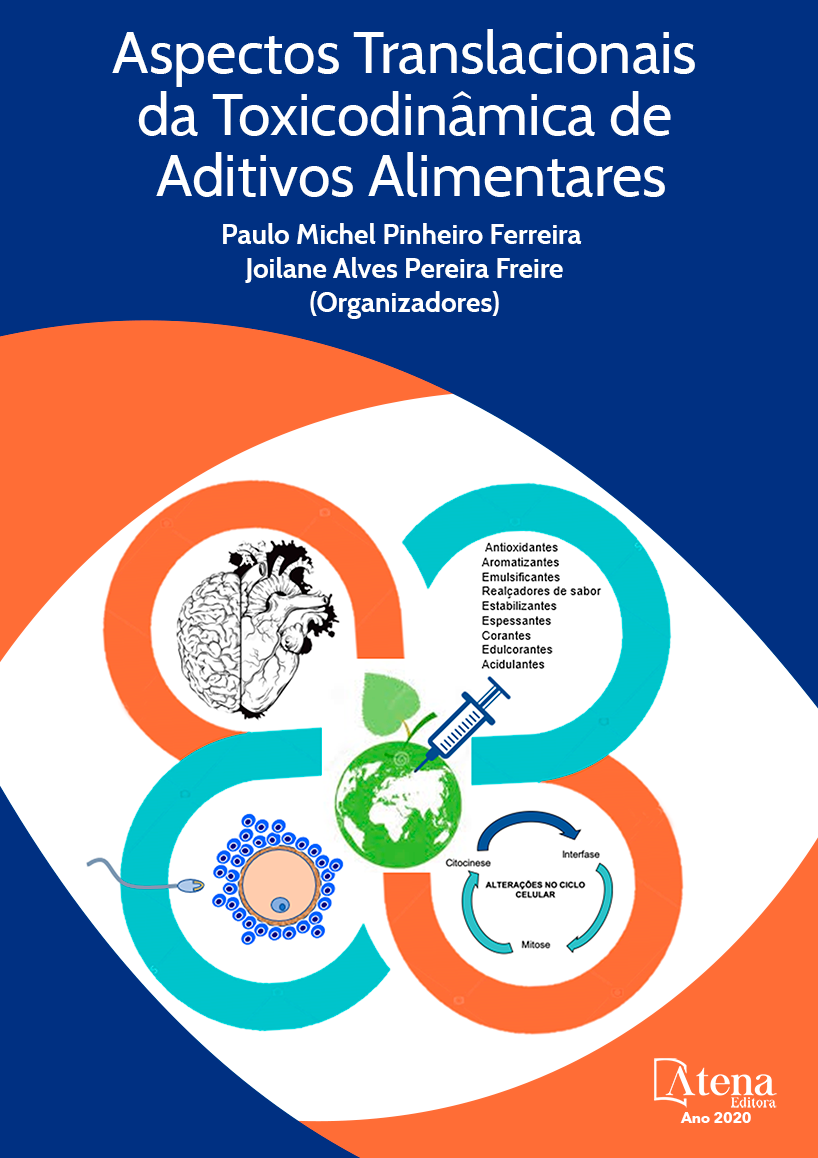
AÇÕES TOXICOLÓGICAS DOS ADITIVOS ALIMENTARES NO SISTEMA CARDIOVASCULAR
Dentre os efeitos nocivos dos aditivos
alimentares ao organismo, destacam-se as
repercussões no sistema cardiovascular. Diante
disso, o presente estudo consistiu em descrever
as alterações toxicológicas dos aditivos
alimentares no sistema cardiovascular. Para
isso, examinaram-se documentos publicados,
aplicando-se como descritores as palavras “Food
additive”, “Toxicity”, “Cardiovascular system”,
introduzidas nas bases de dados MEDLINE/
Pubmed, ScienceDirect, Scopus e Periódicos
CAPES. Constatou-se que “Periódicos
CAPES” (8.329) e “MEDLINE/Pubmed” (5.273)
foram as bases com a maior quantidade de
resultados. Os conservantes podem causar
efeitos tóxicos no sistema cardiovascular por
meio da promoção do aumento da espessura
da camada íntima-média das paredes arteriais,
hipertrofia ventricular, disfunção endotelial,
entre outros. Em relação aos flavorizantes,
corantes e edulcorantes, a literatura relata que
a cardiotoxicidade é promovida, principalmente,
pelo estresse oxidativo. Já os plastificantes,
presentes em embalagens, e indiretamente
atuam como aditivos, podem induzir hipertensão
em virtude do aumento da vasoconstrição
e redução da vasodilatação. Com base nos
estudos observados, infere-se que os aditivos
alimentares exercem direta ou indiretamente
efeitos deletérios no sistema cardiovascular.
Quanto aos mecanismos de ação, o estresse
oxidativo parece ser o precursor dos problemas
ainda que outras vias tenham papel relevante.
AÇÕES TOXICOLÓGICAS DOS ADITIVOS ALIMENTARES NO SISTEMA CARDIOVASCULAR
-
DOI: 10.22533/at.ed.9732009048
-
Palavras-chave: Radicais livres. Disfunção endotelial. Cardiotoxicidade.
-
Keywords: Cardiotoxicity. Free radicals. Endothelial dysfunction.
-
Abstract:
Food additives are substances used in foods that aim to impart or
improve the taste, regulate acidity, among others. Among the harmful effects of
food additives on the body, the repercussions on the cardiovascular system stand
out. Therefore, this study describes the main toxicological changes induced food
additives on cardiovascular system. For this, published documents were examined,
using as descriptors “Food additive”, “Toxicity”, “Cardiovascular system”, both applied
in MEDLINE/PUBMED, ScienceDirect, Scopus and Periodicos CAPES. “Periodicos
CAPES” (8,329) and “MEDLINE/Pubmed” (5,273) were the bases with higher number
of results. Preservatives can cause toxic effects on the cardiovascular system by
promoting increased thickness of the intima-media layer of the arterial walls, ventricular
hypertrophy, endothelial dysfunction, among others. Regarding flavoring, dyes and
sweeteners, the literature reports that cardiotoxicity is mainly promoted by oxidative
stress. Plasticizers present in packaging and indirectly used as additives may lead to
hypertension due to induction of vasoconstriction and vasodilation reduction. Based on
the literature, it is supposed that food additives have directly or indirectly deleterious
effects on the cardiovascular system. Regarding the mechanisms of action, oxidative
stress is the most probable reason as the precursor of problems, although other
pathways have a relevant role.
-
Número de páginas: 15
- Railson Pereira Souza
- Rayran Walter Ramos de Sousa
- Aldeídia Pereira de Oliveira
- Paulo Michel Pinheiro Ferreira


